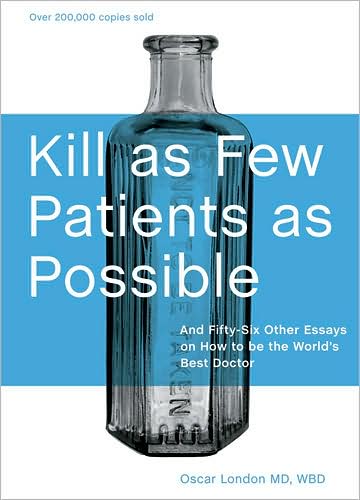First do no harm?
An interesting topic for angry doc and all you newly-minted doctors out there about to be handed the power to harm patients to think about:
Correcting aberration of nature? No dilemma: Goh
BEING born fused to a twin is an “aberration of nature”, and the resulting extreme deformities deserve help, argued Dr Keith Goh in response to Health Minister Khaw Boon Wan’s suggestion to reconsider operating on Indian twins Veena and Vani, 5. They were born fused at the skull.
“Nature never intended for one human being to be stuck in such a manner to another,” the neurosurgeon told Today. “To allow nature to simply take its course is not something I personally believe in. Where is the dilemma there?”
Their situation was different from “procedures that healthy people undertake to beautify themselves and bring large profits to their doctors”.
Mr Khaw had said on Friday that while life may appear “intolerable” for conjoined twins, they could progress to adulthood and “to change the course of nature may do more harm than good”.
Dr Goh agreed with Mr Khaw that ethical issues in conjoined twins cases are “huge and immensely complex ... (But) this is not likely to be the case with Veena and Vani”.
Mr Khaw had said international studies based on 40 pairs of twins joined at the head show that half the patients die while hospitalised, during or after a separation surgery. The outcome of Singapore’s two such surgeries — where three of the four twins have died — “reaffirmed these awful statistics”, he had said.
But Dr Goh, who performed both operations, pointed out that one twin, Ganga, had died only seven years later, and from a chest infection. To his knowledge, nine out of 12 patients worldwide have survived twin separation surgeries since 2000.
In any case, his decision to operate on Veena and Vani will not be based on numbers — but on “their medical condition, anatomy and physiology, and whether we can minimise the risks and complications,” said Dr Goh, who is waiting for the Indian government to work out the logistics and funding for tests, before deciding if he will do the surgery.
ALICIA WONG
The first questions on whether or not to attempt separation of a pair conjoined twins are not of ethics, but of medical science: given the anatomy of the conjoined twins and what we know about physiology and the success (and complication) rates of various surgical techniques we can employ, and with the given resources at hand in terms of manpower, infrastructure, social support etc., what are the risks of mortality and morbidity, and what kind of outcome we can reasonably expect given those circumstances?
Once those things are known, it becomes possible to assess the risks, and to discuss the issue intelligently.
The question of whether or not one is justified in offering or taking those risks for the expected benefits is an ethical one (as is that of whether the state has any right to intervene in the decision of a pair of twins to undergo that risk or for their parents to choose to let them undergo that risk), but to venture an opinion without taking into account those facts in a given pair of conjoined twins is, in angry doc's opinion, irresponsible.
The fact is practically everything we do to a patient as a doctor has the potential to do harm. The only way to do no harm (actively) is to do nothing at all. And what will tell you how much potential harm and how much potential good a given intervention can have is not ethics, but knowledge. If we wanted to allow nature to simply takes its course then we might as well just huddle around a fire in a cave and hope that the sabretooth cats won't attack tonight.
So, my youthful colleagues, as you take your first tentative steps into the wards without a lab-coat, ask yourselves: should the maxim be "First do no harm", or "Kill as few patients as possible"?
(The correct answer is: Neither - call your MO.)
Labels: in the news



5 Comments:
I am about to enter the medical workforce, filled with trepidation, and it makes me wonder why 5 years of education hasn't done enough to allay my fears.
'Call your MO' are wise words in deed. Thanks for the advice. Just that I am pondering if being safe and calling MOs may brand me as incompetent.
By Anonymous, At
April 21, 2009 11:39 pm
Anonymous, At
April 21, 2009 11:39 pm
I am surprised by Mr Khaw's comments. Doctors "change the course of nature" all the time; because of something called Progress, people who may have died 10, 20, 50, or 100 years ago from "natural causes" now live on to a ripe old age.
By aliendoc, At
April 22, 2009 8:24 am
aliendoc, At
April 22, 2009 8:24 am
http://www.pokerlistings.com/strategy/psychology/the-gamblers-fallacy
By Beng, At
April 22, 2009 10:22 am
Beng, At
April 22, 2009 10:22 am
"it makes me wonder why 5 years of education hasn't done enough to allay my fears."
That's because you never had to take full responsibility for someone's life during medical school.
By angry doc, At
April 22, 2009 5:19 pm
angry doc, At
April 22, 2009 5:19 pm
Is this link and conversations still active?
By DrRodrigues, At
September 12, 2017 1:07 am
DrRodrigues, At
September 12, 2017 1:07 am
Post a Comment
Subscribe to Post Comments [Atom]
<< Home